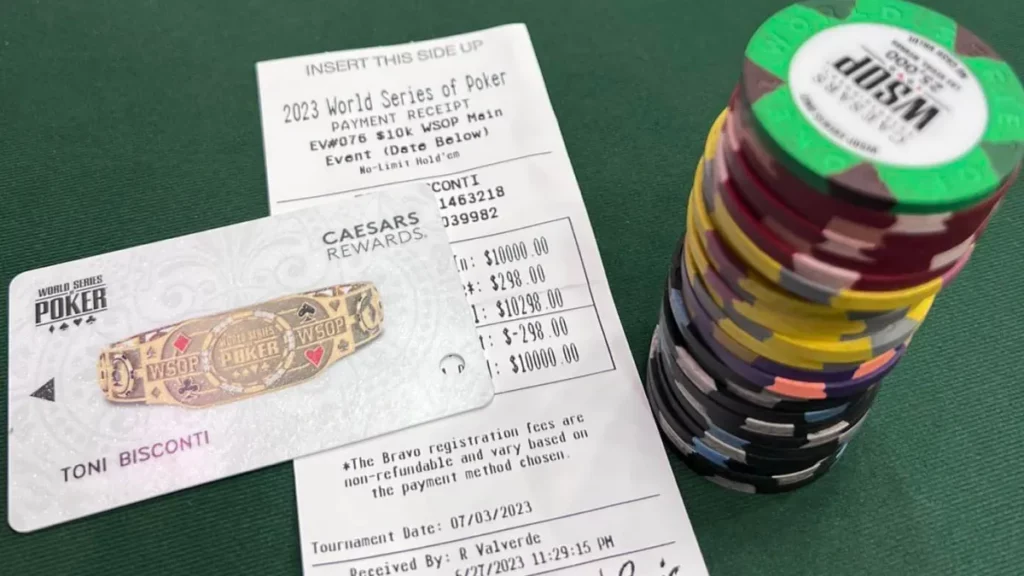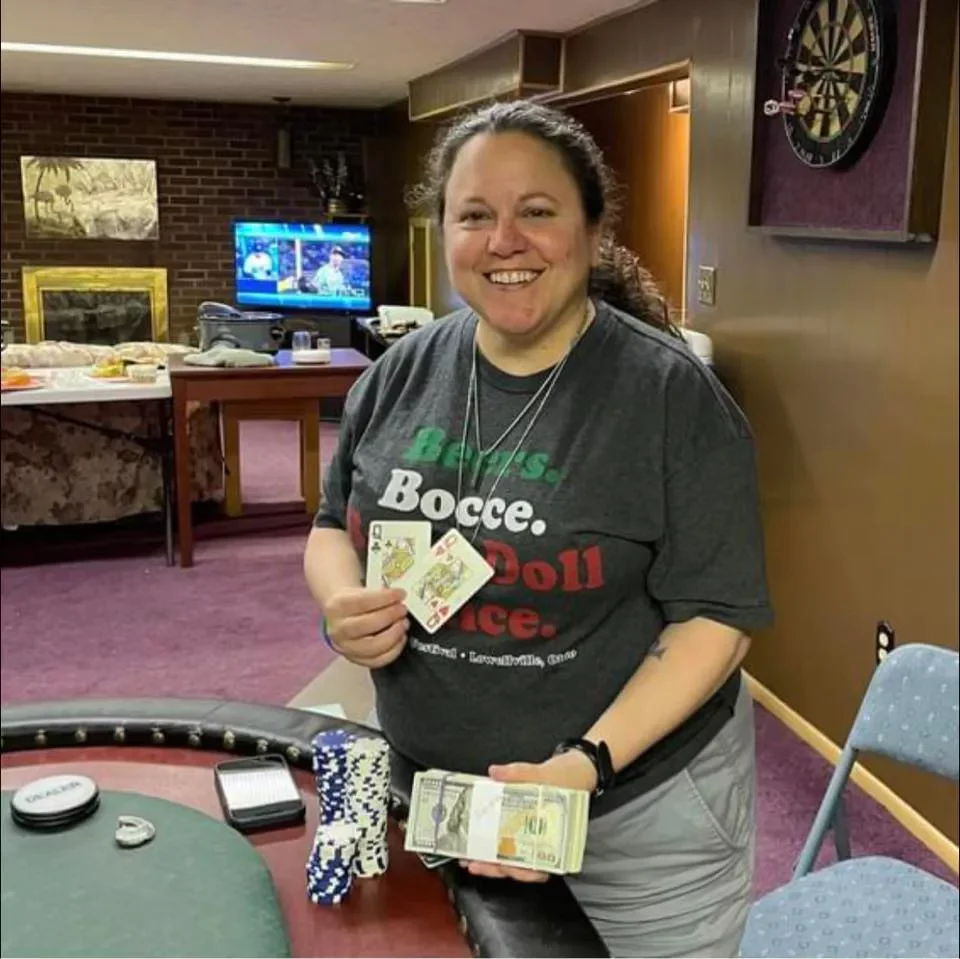Poker Players and Attorneys: Using the Hands They're Dealt
Guest Blogger Toni Lynn Bisconti shares her experience with poker, personality types, and how they relate to the legal field.
August 10, 2023
Toni Lynn Bisconti

When I first started playing poker, some 30ish years ago, I felt like I was part of an old-boys club that had very little use for women, especially those of us who didn’t care how many patriarchal toes we stepped on. I’m not sure it’s changed all that much, but as a 50-year-old woman, I seem to have at least gained some street cred for longevity. I bet if I asked a female attorney, she’d give me the same trajectory of her life between 1993 and today. I’m not going to wax and wane about the state of women in male-dominated worlds, but as a backdrop, I think it’s important.
In 1993, I was in college earning my Bachelor of Science degree in psychology. I thought at the time that having a psych degree would allow me to pursue a career in higher education teaching psychology; little did I know that understanding human behavior would help me in almost every pursuit, including my true love, of course, poker. Becoming better-educated in understanding humans should be part of every profession, hobby, or relationship. We pretty much suck at creating authentic connections with other humans. We’re often too busy worrying about what they think of us to genuinely learn about them. And to be honest, learning about a person, really learning about them, is work. Hard work. But if you do it, and do it right, the pay-off is well worth it.
Before I get off too far on a tangent, let me bring this back to poker. Thirty years ago, I played at people’s houses–it was before the huge popularity boom of Texas Hold ‘Em, before casinos were available in almost every state, and before there were poker leagues at halls all over the country in every size town. Poker back then was 6 or 8 men sitting around a table, drinking beer, smoking cigarettes or cigars, and playing “dealers’ choice” poker, meaning the dealer (who changed after every round) got to choose which poker game they wanted us to play. I was able to break into this world by sheer perseverance. I’m not a traditional woman, which served me well in poker; men often see me as one of the guys. I don’t know if it’s because I’m a lesbian, because I’m fairly androgynous, because I love sports and hate all things “girly,” because they got sick of me poking and prodding into their underworld, or because I’m a “Rainmaker,” but eventually I was in the inner sanctum of the poker world. And I never left it.
My poker career has become much more serious in the last 15 years, as I joined several leagues that play as satellites to the World Series of Poker (WSOP) in Las Vegas. The WSOP Main Event is the most coveted bracelet (that’s what poker players win who are in big circuit games, in addition to the money, of course) in American poker; maybe even in the international arena, but I’m not well-versed on internationally run tournaments. After 30 years of playing recreationally, I finally won one of my leagues, which earned me a seat at the $10,000 WSOP Main Event. The magnitude of this accomplishment felt bigger than earning my Ph.D. Logically, I know it wasn’t, but my doctorate took 4 years to complete; getting to the WSOP took 30. To be fair, anyone can get into the tournament if they want to pay $10,000. My wife, though, doesn’t seem to think 8 of our mortgage payments are worth one tournament entry, so winning a seat was my only option. Getting into the details of a league isn’t important, as they are all run differently, but being one of two people who earned a seat was almost impossible to believe.

Image: Toni Lynn Bisconti with the hand that won her a seat in the World Series of Poker.
So there I was on July 3 of 2023, sitting in a room full of professional poker players (of course, there were a ton of us amateurs there, too) with cameras, lights, the press, the feature table, servers, runners, food stations, commentators, and all the caffeine you could imagine. Poker tournaments of this magnitude take roughly 12 hours/day for several days. In the case of the WSOP, you’re playing 12 hours/day for 5 or 7 or 9 days. It takes up an insane amount of time and focus, and only about 12-15% of us will actually get paid to do it.
Let me jump to the finale. I was not one of the people who got paid. I actually busted out on the first day after dinner – so roughly 9 hours after I began. During those 9 hours, though, I met roughly 18 people at my table–the original 9 that started with me and then about 9 more who filled seats that were vacated by people who busted out before I did. These individuals were from all over the world. The number of accents in poker is more than I’ve experienced anywhere in the world. It’s a beautiful sound if you stop and listen. Although the pervasive sound in a poker room is the clicking of the chips as we “shuffle” them with our fingers, so the beauty of the international accents gets drowned out at times.
What does any of this have to do with personality and law? Well, personality is everything. Law is something I’ve thought more about since working on this project for Metwork. A very large component of poker is reading people. People work hard on eliminating their own “tells” (small behaviors that we do inadvertently when we have a certain type of hand), but they don’t focus as much on reading everyone else. So many players just put on their headphones, put up their hoods, wear their sunglasses, and check out when they aren’t in a hand. As a psychologist, I do the opposite. I watch every hand. I watch every person to see if I can discern tells or patterns. And at minimum, I want to know their personality. Are they calm even when they lose big, or do they react poorly and cause a scene? Are they quiet and reserved or loud and boisterous? Are they resilient to unexpected bad beats, or can they not recover? Learning their personality allows me to play to their weaknesses. Attorneys can benefit from doing this as well. Getting to know your opposing counsel is critical in representing your clients. Exploiting weaknesses is not something that every profession can benefit from. In my real life, I’m a professor, so exploiting the weaknesses of my students or colleagues would not be in mine or their best interest. But in poker and law, I’d say it’s perfectly fair and absolutely in the best interest of your clients and/or your ability to win. It may not be the foolproof way to be successful, but it is certainly a piece of the puzzle that many people overlook.
Toni Lynn Bisconti Ph.D. consulted with Metwork on the integrated personality test we use to guide meaningful connections, build better case teams, and suggest beneficial matches for mentorship. Join Metwork to learn your personality type and explore how our legal community can take your career to limitless heights.
Be limitless. Join now.

